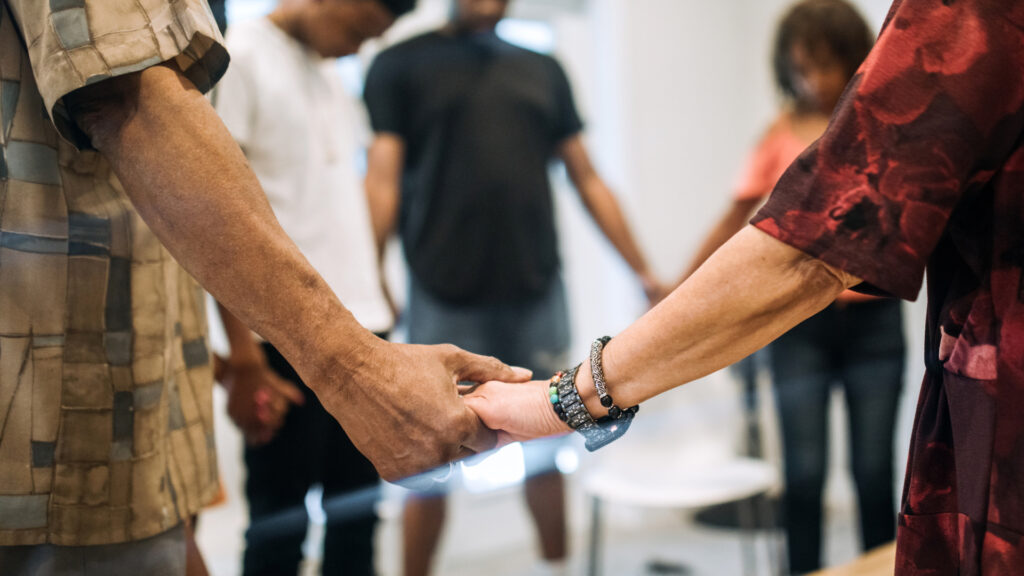Posts by reachchurch
Clean and Connected
Read This Week: Leviticus 12
When the days of her purification for a son or daughter are over, she is to bring to the priest at the entrance to the tent of meeting a year-old lamb for a burnt offering and a young pigeon or a dove for a sin offering. He shall offer them before the Lord to make atonement. – Leviticus 12:6-7 NIV
Leviticus 12 is a brief but significant chapter. It outlines the purification rituals required of women after childbirth in ancient Israelite society. At first glance, its regulations, declaring a woman ceremonially unclean for a period after giving birth and prescribing offerings for her purification, may seem mysterious or even problematic to modern readers. However, when viewed within its historical and Scriptural context, the chapter reveals profound insights about life, community, and the sacred in ancient Israel.
The chapter begins by detailing the periods of ceremonial uncleanness following childbirth: seven days for a male child, followed by a 33-day purification period, and 14 days for a female child, followed by a 66-day purification period. During these times, the mother was restricted from touching holy objects or entering the sanctuary. These rules often raise questions today, particularly about the apparent disparity. In ancient Israel, ritual purity was not about moral failing but about physical states that were seen as temporarily distancing a person from the sacred tabernacle, where God’s presence dwelt. Childbirth, a life-giving act, involved blood, which was symbolic in Israelite theology as the carrier of life (Leviticus 17:11). The longer period reflects practical realities, such as differing recovery needs. Rather than viewing this as unequal, we can see it as an acknowledgment of the physical and spiritual intensity of bringing new life into the community.
The purification process culminated in offerings at the sanctuary: a lamb for a burnt offering and a pigeon or turtledove for a sin offering, poorer families could offer two birds instead. This provision once again provides a practical concern for economic issues. God’s law made space for all, regardless of wealth. The burnt offering showed dedication to God, while the sin offering, despite its name, was not about personal sin but about restoring purity, allowing the mother to re-enter the sacred community. These practices were not just about individual purification but about reconnecting the mother to communal and spiritual life. Childbirth, while deeply personal, was also a communal event, as each new life strengthened the people and was celebrated.
For us, Leviticus 12 invites thought on how we honor the seasons of life. The section’s emphasis on rest, purification, and reintegration suggests a rhythm of withdrawal and return, recognizing the power of life-giving moments. While we no longer observe these specific rituals under the new covenant, the principle of creating space to process major life events. Whether through rest, reflection, or community support, this remains relevant today. This text also challenges us to consider how our communities ensure unity and balance, making spiritual and community participation accessible to all, regardless of the circumstances. Providing for affordable offerings also reminds us to build processes and ministries that don’t exclude people based on their resources, but instead that Father God loves everyone and is eager to meet the needs of all of His people.
Ultimately, the chapter is less about restriction and more about reverence for life, for the body, and for the community’s connection to the Lord. It invites us to see the sacred in the ordinary, to honor the physical and spiritual dimensions of our experience here on earth, and to create spaces where everyone can belong. By understanding these Levitical laws in their context, we press into being clean and connected in our modern context and uncover timeless truths about care, inclusion, and the holiness of God’s gifts and life’s milestones.
The Little Things
Read This Week: Leviticus 11
These are the regulations concerning animals, birds, every living thing that moves about in the water, and every creature that moves along the ground. You must distinguish between the unclean and the clean, between living creatures that may be eaten and those that may not be eaten. – Leviticus 11:46-47 NIV
Leviticus 11 is about something we all need and love: food. It outlines the dietary laws God gave to the Israelites, distinguishing between clean and unclean animals. These guidelines, often seen as ancient or overly technical, carry theological and practical implications that resonate even in our modern context. But at its core, Leviticus 11 is about holiness or God’s desire for His people to be set apart.
The chapter begins with God instructing Moses and Aaron to tell the Israelites which animals they may eat and which are deemed unclean (v. 1-2). The detailed lists of animals, clean creatures like those with split hooves and chewing the cud (cattle and sheep) and unclean ones like pigs or shellfish, aren’t random. They reflect a divine call to distinction, to a greater responsibility. These laws reflect God’s character. In verses 44-45, the Lord says to consecrate yourselves and be holy because I am holy. I am the Lord who brought you up out of Egypt to be your God. The dietary regulations were a tangible way for Israel to embody their unique covenant relationship with Yahweh. By adhering to these, they demonstrated obedience and trust, marking themselves as distinct from surrounding nations.
This theme of holiness extends beyond food. The separation of clean and unclean reflects a broader principle: God’s people are called to a greater responsibility to live differently and align their lives with His character. The laws reminded Israel that every aspect of life, even eating, was an opportunity to worship and reflect God’s order in a chaotic world. While we, as Christians today, are not bound by the dietary laws of Leviticus (see Acts 10:9-16, where Peter’s vision declares all foods clean), the principles behind them offer timeless wisdom of what is expected of us in our daily lives to reflect God’s glory even in small ways.
This passage encourages us to be mindful of what we consume. Not just food but media, ideas, and influences. Just as the Israelites were called to discern between clean and unclean, we can ask: Are we filling our minds and bodies with things that honor God and promote flourishing? For example, choosing nourishing food over unhealthy options or curating media intake to avoid toxic content can reflect a commitment to holiness. Additionally, the detailed nature of these laws required the Israelites to live thoughtfully; every meal was a reminder of their identity as God’s people. Today, we can adopt a similar intentionality. Simple practices like praying before meals, making ethical choices, or being grateful for God’s provision can transform mundane acts into spiritual disciplines and enjoyable moments with Jesus.
The dietary laws also helped Israel maintain a distinct identity as God’s covenant people. In a world of competing values, we can draw on this by cultivating habits that reflect our faith. Whether it’s prioritizing community worship, serving others, or standing firm in our convictions, our choices can signal an allegiance to God’s kingdom and the gospel mission. We don’t always understand the “why” behind everything, but obedience is an act of trust. Similarly, we may not always fully grasp God’s purposes, but trusting His guidance through Scripture or the Holy Spirit can provide us with a sense of stability in uncertain times.
For Christians, the fulfillment of the law in Jesus (Matthew 5:17) reframes Leviticus 11. The dietary laws pointed to a deeper reality that we need purity and separation from sin, which Christ accomplishes through His sacrifice. This doesn’t render Leviticus irrelevant to today; instead, it invites us to view it through the lens of grace. We’re free from the letter of the law but called to the spirit of holiness and living in a way that honors God and blesses others, even in the little things. It calls us to live with purpose, to make choices that reflect our identity as God’s people, and to trust in His wisdom. Whether through mindful consumption, intentional living, or embracing our freedom in Christ, we can embody the holiness Leviticus envisions not as a burden but as a beautiful walk with God in every area of life.
Risky Business
Read This Week: Leviticus 10
Aaron’s sons Nadab and Abihu took their censers, put fire in them, and added incense; and they offered unauthorized fire before the Lord, contrary to his command. So fire came out from the presence of the Lord and consumed them, and they died before the Lord. – Leviticus 10:1-2 NIV
Leviticus 10 is a sobering narrative in our study of Greater Responsibility. It really highlights the holiness of God and the seriousness of approaching Him in worship, as seen in the tragic story of Nadab and Abihu, two of Aaron’s sons, who offered unauthorized fire before the Lord, resulting in their immediate death by divine judgment (v.1-2). Here, amidst detailed priestly instructions, it serves as a theological cornerstone, revealing God’s sovereignty and the necessity of obedience to Him. Yet, it also offers practical lessons for us, challenging us to examine how we approach God in our daily lives and how we live out our calling as His people.
Nadab and Abihu’s sin was not merely a procedural misstep but a violation of God’s explicit commands regarding how He was to be worshiped. The unauthorized fire they offered shows a disregard for Yahweh’s prescribed methods, possibly driven by presumption, carelessness, or even pride. God’s response to consume them with fire is difficult to read, but it demonstrates that He is not to be approached with disrespect or flippantly. He demands reverence and obedience, particularly from those set apart for His service. For the Israelites, this event clarified that the priesthood was not a casual role but a sacred responsibility requiring meticulous adherence to God’s word. This points to a broader truth: the Lord’s character is unchanging, and His call to holiness extends to all who seek to draw near to Him.
We are left sober and serious by this passage. We are also to approach God with intentional respect in both corporate worship and personal devotion. While we no longer operate under the Levitical law, the principle of honoring God’s holiness remains a fundamental aspect of our faith. As before, we should consistently examine our motives and attitudes when we pray, serve, or participate in worship. We must be careful not to approach the Lord with our version of unauthorized fire but rather come before God with our lives on His terms. We have to avoid prioritizing convenience, personal preference, or cultural trends over biblical loyalty. For instance, when we engage in worship, whether through song, prayer, or service, we must ask whether our actions align with God’s revealed will in Scripture. Leviticus 10 invites us to cultivate a heart of humility, ensuring that our worship is not self-centered but God-honoring.
God says in verse 3 those who are near me, I will be sanctified, and before all the people, I will be glorified, letting us know the public-facing aspect of our faith and obedience. Nadab and Abihu’s failure was not just a private issue; it impacted the entire community’s perception of God’s holiness. Similarly, our actions as believers reflect Christ to those around us every day, whether it is living with integrity in our workplaces, homes, and communities. When we compromise ethically or act hypocritically, we risk misrepresenting who God is and what a follower of Jesus looks like. But when we live in obedience and show love, honesty, and faithfulness, we glorify God and point others to Him. This is especially relevant in moments of temptation, where choosing to do right over convenience is an example of what God demanded of His priests.
The last part of the chapter, where Aaron and his remaining sons navigate the aftermath of this tragedy, offers additional practical wisdom for us. Aaron’s silence in verse 3 reflects a posture of submission to God’s judgment, even in the midst of his intense grief. This teaches us the value of trusting God’s sovereignty when His ways are difficult to understand. Additionally, God’s instructions to Aaron about abstaining from wine (v. 8-11) suggest that Nadab and Abihu’s actions may have been influenced by impaired judgment, reinforcing the need for clarity in our spiritual responsibilities. It’s essential to maintain discipline, whether by avoiding distractions, guarding our minds against other influences, or prioritizing time in the Bible to discern His will.
This was a heavy chapter but also a powerful reminder that a God who is both gracious and just, still passionately calls His people to reflect His character. Not taking that seriously for the Israelites and us is risky business. It can lead to devastating things in our lives, both personally and collectively. Leviticus 10 urges us to approach God with humility, align our lives with His Word, and live in a way that glorifies Him before others. By doing so, we honor the God who invites us into His presence while upholding the seriousness of that privilege.
Being Deliberate
Read This Week: Leviticus 9
They took the things Moses commanded to the front of the tent of meeting, and the entire assembly came near and stood before the Lord. Then Moses said, “This is what the Lord has commanded you to do, so that the glory of the Lord may appear to you.” – Leviticus 9:5-6 NIV
Leviticus 9 shows us the beginning of Aaron and his sons carrying out their priestly duties, offering sacrifices to atone for their sins and that of the people. This chapter, set against the backdrop of the newly established Tabernacle, reveals the detailed and spiritual balance between divine holiness and human responsibility. The priests’ intentional adherence to God’s instructions once again highlights a timeless truth: worship is not a casual act but a deliberate and obedient response to God’s presence.
As Aaron prepares the sin offering, burnt offering, and fellowship offering, each step is prescribed by God, emphasizing that approaching Him requires reverence and alignment with His will. For us in A Week in the Life, ancient worship rituals, animal sacrifices, and priestly practices seem far removed from our daily lives in the modern world. Yet, the principle remains that God desires intentional devotion, not just emotional spontaneity. It calls us to ask the question: are we approaching our worship with the same care, ensuring our hearts and actions align with God’s standards? This is a tough question for us but one that should be asked of believers with a greater responsibility to serve Jesus and communicate His word and love to those around us.
The chapter’s enduring theme is evident when God’s glory appears, and fire consumes the offerings, a powerful affirmation of His presence. The people’s response, shouting for joy and falling facedown, shows awe and submission to the holiness of God and His will. This divine fire, both a sign of approval and a reminder of God’s sovereignty and power, invites us to consider how we experience His presence today. Do we expect God to show up in our worship, or have we grown complacent, assuming His approval without seeking His guidance? We are appropriately challenged in this passage to prepare our hearts, much like Aaron prepared the sacrifices, trusting that God will meet us where we are when we honor Him with obedience.
The priests’ role also communicates the importance of leadership in worship. Aaron’s actions bridged the gap between a holy God and His flawed family, pointing to the ultimate Mediator, Jesus, who fulfills the sacrificial system. Christ is our Mediator and intercedes on our behalf to the Father. But we need leaders like pastors, parents, church servants, and mentors to model faithful worship that draws others closer to God. This example of spiritual leadership is crucial to the kingdom and cause of Christ today, especially amid the prevalence of subjective truth in society and Scriptural ambiguity. We need leaders who are committed to standing in the gap for others, just as the Lord asked of the priests in Leviticus.
Finally, this section invites reflection on the cost of disobedience, subtly foreshadowed by the tragic events of the next chapter. The priests’ careful obedience here contrasts with Nadab and Abihu’s later failure, reminding us that God’s holiness demands respect and a response in accordance with His will. This reaction isn’t about legalism or religiosity but about recognizing that our freedom in worship comes with accountability and follow-through. Today, we may not offer bulls or goats, but we’re called to present our lives as living sacrifices (Romans 12:1). Leviticus 9 is another movement toward greater responsibility and a call to examine our approach to God. Are we being deliberate in offering Him our best, in obedience and awe, or are we coasting on convenience?
Consecrated
Read This Week: Leviticus 8
Then Moses took the anointing oil and anointed the tabernacle and everything in it, and so consecrated them. He sprinkled some of the oil on the altar seven times, anointing the altar and all its utensils and the basin with its stand, to consecrate them. – Leviticus 8:10-11 NIV
Our next stop on the journey through Leviticus is Chapter 8, which offers a perceptive glimpse into the sacred process of consecrating Aaron and his sons as priests. This occurrence is a pivotal moment in Israel’s spiritual history, and this section details the meticulous practices God commanded through Moses to prepare the priests for their holy duties, emphasizing familiar Old Testament themes of obedience, purification, and divine appointment. For us, it provides current insights into spiritual leadership, personal preparation, and the importance of approaching a holy God in the right way.
The chapter begins with God instructing Moses to gather Aaron, his sons, the priestly garments, the anointing oil, and sacrificial animals before the entire Israelite community at the entrance of the Tabernacle. This public setting shows the communal significance of the priesthood — priests were not just individuals but representatives of the people before God. The act of assembling the entire congregation (v. 3) highlights the shared responsibility of the community to support and uphold spiritual leadership. Today, this reminds us to actively pray for, encourage, help, and support those called to lead in our families, churches, and faith communities, recognizing their pivotal role as representatives of God the Father.
Moses then washes Aaron and his sons with water, a symbolic act of purification (v. 6). This cleansing calls for the need for spiritual transparency and purity before entering into God’s service. The washing wasn’t just physical but pointed to the inner holiness required of those who approach God. For us, this serves as a reminder to examine our hearts before taking on responsibilities in service to God or others. Whether leading a small group, volunteering, or simply living out our faith, we must approach our roles with humility and a commitment to personal integrity.
Next, Moses clothes Aaron in elaborate priestly garments, including the tunic, sash, ephod, and breastpiece, each piece rich with symbolic meaning (v.7-9). These garments set Aaron apart, visually marking his role as a high priest. The detailed attire illustrates to us that spiritual leadership often carries outward responsibilities. Leaders are held to a higher standard, and this encourages us to clothe ourselves with virtues such as diligence, compassion, wisdom, and faithfulness, as described in Colossians 3:12, especially when we’re called to represent God’s heart and truth to others.
The anointing with oil (v. 12) is a decisive moment in the chapter. It symbolizes the Holy Spirit’s empowerment for service. By pouring oil on Aaron’s head, Moses consecrates him, setting him apart for God’s work. This act points to the necessity of divine enablement in any meaningful service. For modern believers, it serves as a reminder that our strength and effectiveness come not from our abilities but from God’s Spirit working through us. Before taking on any task, whether parenting, mentoring, or leading, it is essential to seek God’s guidance and empowerment prayerfully.
A striking detail is the blood applied to Aaron’s ear, thumb, and toe (v.23-24), which shows us that the priest’s entire being, their thoughts, actions, and walk must be dedicated to God. This vivid imagery challenges us to consider whether every part of our lives aligns with God’s purposes. Are our thoughts pure? Do our actions reflect His love? Does our daily walk honor Him? This holistic devotion is a powerful reminder for anyone seeking to live a life set apart for God, whether in formal ministry or everyday activities and vocations.
The chapter concludes with Aaron and his sons remaining at the entrance of the Tabernacle for seven days, completing their ordination (Leviticus 8:33-36). This period of waiting was critical to preparation and patience in God’s service. Rushing into spiritual responsibilities without proper grounding can lead to ineffective or prideful leadership. There is great value in taking time to prepare through studying God’s word, prayer, and reflection before stepping into roles of influence or service.
Handle Responsibility
Read This Week: Leviticus 7
These, then, are the regulations for the burnt offering, the grain offering, the sin offering, the guilt offering, the ordination offering and the fellowship offering, which the Lord gave Moses at Mount Sinai in the Desert of Sinai on the day he commanded the Israelites to bring their offerings to the Lord. – Leviticus 7:37-38 NIV
Leviticus 7 is a framework for living with intention, accountability, and community. This chapter outlines the procedures for the guilt offering and the fellowship offering, as well as the priests’ responsibilities in handling these sacred acts. As we have already seen, while the practices of animal sacrifice may seem far removed from modern life, the principles embedded in this part of our study offer timeless wisdom that can guide us in our relationships, in our greater responsibilities as followers of Christ, and in taking stock of our spiritual lives.
The guilt offering, detailed in the opening verses, is more than a mere ritual. It’s a process of making things right with God vertically and with other people horizontally. Verses 1-7 describe how the offering requires not only a sacrifice to God but also restitution to those who have been harmed, as mentioned in Chapter 6. This offering often came with an additional 20% as a gesture of sincerity and genuine amends. The principle of accountability that we read here is strikingly relevant today. Whether it’s apologizing for a wrong, repaying a debt, or repairing trust, the guilt offering reminds us once again (a theme in this part of Leviticus) that true reconciliation involves action, not just words. It challenges us to examine whether we’ve wronged someone, to take tangible steps to make it right, and not just settle for fleeting apologies that are most likely not to last.
In contrast, the peace offering (v. 11-34) is a celebration of gratitude and connection. Unlike other sacrifices, this one often involved a shared meal, where the offerer, their family, and even the priests partook together. It was a moment of fellowship, symbolizing harmony with God and connection to His family. In our busy, fast-paced world, this resonates with us as a call to pause and invest in cultivating community with the body of Christ, our family, friends, and others. Whether through shared meals, conversations, or acts of generosity, the peace offering teaches us that gratitude isn’t meant to be private; it’s a communal act that strengthens bonds. It could be as simple as hosting people in our homes, celebrating an accomplishment or milestone, or reconnecting with our loved ones. This posture in life is the spirit of the fellowship offering in action.
We also see something evident in previous chapters, which is the emphasis on the priests’ role, with rules about how offerings must be handled (v. 8-10, 35-38). The Old Testament teaches us that the sacred was not to be treated carelessly and that the priests were held to a high standard of integrity in their administration of worship. This speaks to the importance of trustworthiness in leadership, whether in a spiritual, professional, or personal context. Leaders set the tone for how sacred things are to be honored, whether it be trust, values, or shared goals. For us, this might mean reflecting on how we steward our responsibilities: Are we careless with the trust others place in us, or do we handle it with care?
Perhaps the most practical lesson here is the call to intentionality. Every offering had a specific purpose, a cost, and a process. There was nothing done or instructed haphazardly. This purposeful approach always invites us to examine our offerings and the time, energy, and resources we dedicate to our faith, relationships, or work. It prompts us to ask: Are we giving thoughtlessly or with purpose? For example, when we apologize, do we mean it and follow through? When we express gratitude, do we make space to share it with others? The greater responsibility of the believer is to fulfill our promises and to live as grateful people to God and His grace in our lives. The Scriptures encourage us to live deliberately, ensuring our actions align with our values.
It is so easy to prioritize speed over substance these days. But this chapter of Leviticus offers a countercultural message: slow down, be intentional, and prioritize reconciliation and connection. While we no longer bring animals to an altar, we can still embody the principles of God’s word by seeking forgiveness with sincerity, fostering community through shared moments, and handling our responsibilities with integrity. Next time we’re tempted to rush through an apology or skip a chance to connect with the Lord and others, remember our call to live with purpose. It’s a small but powerful step toward a life of deeper meaning and stronger relationships.
Restorative Action
Read This Week: Leviticus 6
When people sin in any of these ways and realize their guilt, they must return what they have stolen or taken by extortion, or what was entrusted to them, or the lost property they found, or whatever it was they swore falsely about. They must make restitution in full, add a fifth of the value to it, and give it all to the owner on the day they present their guilt offering. – Leviticus 6:4-5 NIV
This Week in the Life, Leviticus 6 primarily focuses on the laws governing various sacrifices (some we have already studied) like the burnt offerings, grain offerings, sin offerings, and guilt offerings, while also addressing restitution for wrongs committed. Its emphasis on ritual purity, atonement, and ethical conduct resonates with timeless truths about integrity, responsibility, and reverence for Father God. The Bible is eternally theological and practical for us. It helps us apply ancient principles from Scriptures like this passage that inform, empower, and inspire successful, spiritual living in our contemporary context.
The chapter starts with God’s instructions to Moses about the burnt offering, which was to remain on the altar all night, with the fire continuously burning (v. 8-13). This perpetual fire symbolizes God’s unwavering devotion and constant presence among His people. For the Israelites, maintaining the fire was a priestly duty, reflecting their role as mediators between God and the people, which we experience in our relationship with Christ. Likewise, this imagery invites us to consider what keeps our spiritual fire burning. In a world of distractions, maintaining a consistent connection to the Word and family of God, whether through prayer, reflection, worship, service, or just acts of kindness, requires intentionality. It requires a heart set on God, time for personal worship, prayer, mindfulness, and other spiritual disciplines to nurture our inner life, ensuring our focus on what matters most doesn’t fade out.
Verses 14-23 shift to the grain offering, detailing how priests prepare and present it, with a portion burned, as we’ve seen before, a pleasing aroma to God, and the rest consumed by the priests. This offering, made from fine flour and oil, represents gratitude and dependence on the Lord’s provision. The specifics of the instructions are also intentional. There was to be no leaven, no honey, but it was always to contain salt, which underscores the importance of approaching sacred things with precision and respect. This practice is challenging for us to cultivate gratitude in our daily routines. It is a practical step that could be like keeping a gratitude journal, noting three daily things that remind us of life’s blessings. In like, the grain offering anchors us in humility and appreciation, building a mindset that honors both the giver and the gift.
The sin offering (v. 24-30), required for unintentional sins, then addresses God’s desire for reconciliation over punishment. The ritual’s focus on cleansing reflects an understanding that mistakes, when acknowledged, don’t have to define us. We can see profound relevance today, as we often struggle with guilt or shame over our errors. Leviticus 6 encourages a proactive approach in life, to own the mistake, make amends, and seek restoration. Practically, this is like apologizing sincerely when we’ve wronged someone, seeking restoration, or reflecting on our actions to learn and grow. The sin offering reminds us that accountability and grace pave the way for healing and renewed relationships.
However, perhaps the most striking part of this section is verses 1-7, which deal with sins involving deceit, theft, or fraud. Here, God commands a guilt offering and restitution with an additional twenty percent to the wronged party. This requirement highlights a profound ethical principle: true repentance involves making things right with the Lord and others. In modern terms, this could mean repaying a debt with interest, offering a heartfelt apology, taking steps to repair harm caused by our actions, and being consistent with our behavior going forward. For example, if we’ve spread gossip or misinformation, we should openly correct it and ensure those affected are aware of the wrong. This principle exhorts us to move beyond apologizing to actively restoring trust and justice in our families, workplaces, and communities.
Though rooted in ancient worship, Leviticus 6 speaks to the heart of the believer’s greater responsibility – to God, others, and ourselves. It’s call to maintain spiritual commitments, express gratitude, seek forgiveness, and make restitution offers a blueprint for living with integrity. We can embody the chapter’s wisdom and power by reading and absorbing these biblical principles into our daily practices through consistent prayer and reflection, gratitude, and intentional, restorative actions. In a world that often feels fractured, we are compelled to consider that holiness and abundant living are frequently expressed in how we treat others, willful restorative action, and the honor of our connection to God through Christ.
Accountability
Read This Week: Leviticus 5
When anyone becomes aware that they are guilty in any of these matters, they must confess in what way they have sinned. As a penalty for the sin they have committed, they must bring to the Lord a female lamb or goat from the flock as a sin offering; and the priest shall make atonement for their sin. – Leviticus 5:5-6 NIV
Leviticus 5 is about accountability and recognizing our shortcomings as we find a way back to wholeness. The chapter details the sin offering, a sacrifice required for various offenses, unintentionally breaking God’s commands, failing to speak up when you know the truth, or even touching something unclean. What sticks out in this section is how seriously God takes human accountability, even for mistakes we didn’t mean to make, and the greater responsibility that followers of Jesus should also take. This part of our study isn’t about piling on guilt; it’s about fostering a life of integrity. It can be easy to shrug off small missteps, but we are reminded that acknowledging even unintentional wrongs keeps our hearts aligned with truth.
One of the most practical lessons here is the call to confession. Verse 5 says that when anyone becomes aware that they are guilty in any of these matters, they must confess how they have sinned. Confession isn’t just going through the motions; it’s a moment of honesty with God and ourselves. Confession could look like pausing to reflect on moments where we’ve fallen short. Maybe we hurt someone with careless words, missed an opportunity to help, or lost trust by breaking a promise we didn’t keep. Confession clears the air, not because God needs to hear it, but because we need to call it out. What God called the Israelites to do is something we can practice today. We can set aside a quiet moment to seek the Lord, ask Him to bring things to our hearts and minds, the sins and offenses, however small or insignificant, and then offer them up in confession to Him through prayer. It’s a simple practice that echoes the spirit of the sin offering and brings peace and restoration.
What’s beautiful about this chapter is its spiritual accessibility. God didn’t demand the same sacrifice from everyone; He judged the sin offerings with what one could afford. Lambs for the wealthy, birds for the modest, and even flour for those who did not have much. This shows a Father God who meets people where they are, not where they should be. In our lives, this translates to spiritual growth that fits our unique person. We don’t have to be pastors or theologians to take accountability for our lives and grow closer to God. We can start where we are. We have access to God’s throne through Christ and can pray, repent, serve others, or have a moment of gratitude that brings us deeper intimacy with the Lord. God values the heart behind the offering, not its level of piety or size.
Finally, Leviticus 5 certainly points to accountability, but also to grace. The sin offering wasn’t about earning forgiveness but about receiving it. The sacrifices provided a way for people to move forward, cleansed and restored. For us as Christians, this foreshadows Jesus’ ultimate sacrifice and is an encouraging reminder that God desires to restore, not condemn. When we mess up, we don’t have to hide. We can bring it to God. He sees us, cares, loves us, and always responds with faithfulness and grace. This chapter isn’t just another outline of ancient spiritual law; it’s a blueprint for living with honesty, humility, and hope. May the Holy Spirit help us take one step toward accountability. Recognize a fault, make it right where possible, and trust that grace is already waiting.
Intent
Read This Week: Leviticus 4
If the whole Israelite community sins unintentionally and does what is forbidden in any of the Lord’s commands, even though the community is unaware of the matter, when they realize their guilt and the sin they committed becomes known, the assembly must bring a young bull as a sin offering and present it before the tent of meeting. The elders of the community are to lay their hands on the bull’s head before the Lord, and the bull shall be slaughtered before the Lord. – Leviticus 4:13-15 NIV
The fourth chapter of Leviticus brings us to a reflective and challenging place this week. It details and outlines the various practices for the sin offering, a sacrifice designed to address unintentional sins committed by individuals, leaders, or the community. This section’s detailed prescriptions of worship, like the specific animals, precise actions, and the sprinkling of blood, might feel distant, or rooted in an ancient priestly system far removed from modern life. But beneath the surface lies a timeless truth: human imperfection is universal, and reconciliation with God requires acknowledgment, intentionality, and grace.
Leviticus 4 categorizes sins by the priests, the whole community, rulers, or ordinary individuals, demonstrating that no one is exempt from moral failure, regardless of status or role. This commonality of original sin resonates today, reminding us that mistakes, whether born of ignorance or oversight, carry consequences that ripple beyond the individual. The sin offering’s emphasis on unintentional sins is particularly striking (v. 13, 22). It underscores a sobering reality: sin or harm can occur even without particular forethought of doing wrong. Here, the Scriptures prompt us to reflect on our blind spots, or those moments and instances when we inadvertently hurt others or stray from our values underwritten by biblical direction.
The sacrifice required the offender to bring something, often costly, to the altar, symbolizing the weight of sin and the commitment to make it right through repentance and amends. Practically, this invites us to consider how we address our own missteps. Do we dismiss unintentional wrongs as inconsequential, or do we take responsibility, seeking to repair the damage? The offering wasn’t a mere transaction but a public acknowledgment of fault and a humbling step toward restoration. In our world, this is like being broken with the help of the Holy Spirit, being contrite, offering a sincere apology, making restitution, or changing our behaviors to prevent these things from happening again.
Another layer of this passage is the focus on atonement through blood, a concept that carries profound symbolic weight. Blood, representing life, was used to purify and reconcile, pointing to the seriousness of sin as a breach in the human relationship to God. For the Israelites, the priest’s role in facilitating this process highlighted the need for a bridge between human imperfection and God’s holiness. While we may not engage in animal sacrifices, seeking mediation endures because Christ has become our Mediator through His death, burial, and resurrection (1 Tim. 2:5). Whether through the Bible, prayer, community support, or personal reflection, we seek ways to bridge the gap between our flaws and our aspirations. Atonement for sin isn’t passive. Jesus’ sacrifice on the cross to atone for our sins wasn’t by chance; it was intentional through the will of God. Similarly, repentance demands action, vulnerability, and a willingness to confront our shortcomings head-on with the Lord’s help.
The chapter also reveals God’s character as both just and merciful. The provision of the sin offering reflects the Father’s desire for relationship over condemnation. God could have demanded perfection, but instead offered a path to restoration, tailored to the offender’s means (a bull for a priest, a goat for an individual). This adaptability speaks to His compassion and meeting us where we are. In practical terms, it challenges us to extend similar grace to others. When someone wrongs us unintentionally or intentionally, do we demand retribution or offer a path to reconciliation with them? The Scriptures call us to emulate God’s balance of justice and mercy, fostering relationships prioritizing healing over punishment. This approach is our greater responsibility as believers to act and respond differently than unbelievers in such matters.
We are learning that Leviticus is less about rituals and more about God’s desire for our heart’s posture. It invites us to focus on Jesus, self-awareness, humility, and a commitment to spiritual growth. In a world quick to deflect blame or minimize harm, this chapter offers a countercultural model to own our mistakes, seek reconciliation, and trust in the possibility of renewal, no matter the intent. By embracing these principles, we can move toward a life marked by accountability, grace, and a more profound connection with both God and one another.
Seeking Peace
Read This Week: Leviticus 3
From the fellowship offering you are to bring a food offering to the Lord: its fat, the entire fat tail cut off close to the backbone, the internal organs and all the fat that is connected to them, both kidneys with the fat on them near the loins, and the long lobe of the liver, which you will remove with the kidneys. The priest shall burn them on the altar as a food offering presented to the Lord. – Leviticus 3:9-11 NIV
At this point in our study of Greater Responsibility, we arrive at Leviticus 3, which introduces the peace offering, a voluntary act of worship in ancient Israelite practice that holds profound spiritual and communal significance. It also has meaning and is an example for us in modern times. There is probably no one among us who would disagree with the premise that we all need more direction and exhortation on seeking and achieving peace in our hearts with Father God and pursuing that same peace with others in our lives.
Peace is often elusive in our times, and unlike sin or burnt offerings, which focus on atonement or total dedication to the Lord, the peace offering emphasizes fellowship, gratitude, and shared celebration vertically with Christ and horizontally with the family of God.
This chapter outlines the specific procedures for presenting an unblemished animal, whether from the herd or flock, highlighting the importance of intentionality in worship. The offerer lays hands on the animal, symbolizing personal identification with the sacrifice, and specific portions, like the fat and kidneys, are burned as an offering to God. At the same time, the rest is shared among the priests and the offerer’s community. This community meal highlights the peace offering’s role as a bridge between God and human beings, which fosters unity and thanksgiving.
When we feel connected to God and the people in our lives, it elicits a sense of gratitude and thankfulness that expresses itself in deeply spiritual and healthy ways. Furthermore, the repeated emphasis on offering without blemish reflects a call to bring one’s best to God. This principle resonates beyond the sacrificial system and speaks to the heart and motivation of a faithful person.
This section may seem routine for modern believers, with its detailed rituals rooted in a specific cultural and religious context. Yet, its core themes of gratitude, intentional worship, and community keep the content of this chapter profoundly relevant. The peace offering invites reflection on how we express thankfulness in our lives. It challenges us to be intentional in setting aside time to seek God and acknowledge our blessings, whether through prayer, acts of service, or shared moments with others.
The community aspect of the offering also encourages us to consider how our faith builds and fosters connection. In our world, which is often marked by division, the peace offering’s model of shared celebration and worship points to the power of collective gratitude to heal and unite. Furthermore, the requirement of an unblemished offering prompts us to examine the quality of our own sacrifices. The time, resources, or energy we dedicate to our spiritual lives are vital to the depth and health of our walks with God. Are we offering our best with the right heart attitude, or merely what’s convenient?
Practically, Leviticus 3 can inspire simple yet meaningful practices in our lives. It can push us to a greater responsibility of expressing gratitude and promoting that in our gatherings, where the people of God, friends, or family spend time together and reflect on their blessings, mirroring the peace offering’s Spirit-led communal life. Alternatively, we can dedicate a specific time each week to journal or pray about what we’re thankful for, ensuring our gratitude is genuine and lasting rather than fleeting. As we seek peace and deepen our faith, we must evaluate our heart’s intent and how we allocate our resources.
Our time, money, gifts, and talents should be an outward result of our desire to offer the Lord our best to bring glory to Him. This approach by the Israelites is the modern template of what the peace offering gives us. By embracing its principles, we can cultivate gratitude, purpose, and community, transforming our everyday moments into a life seeking peace.









